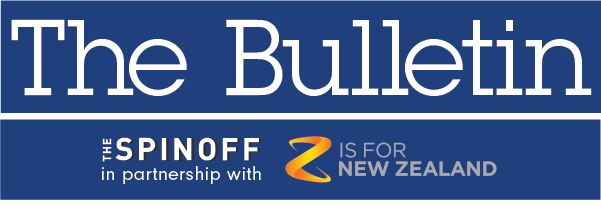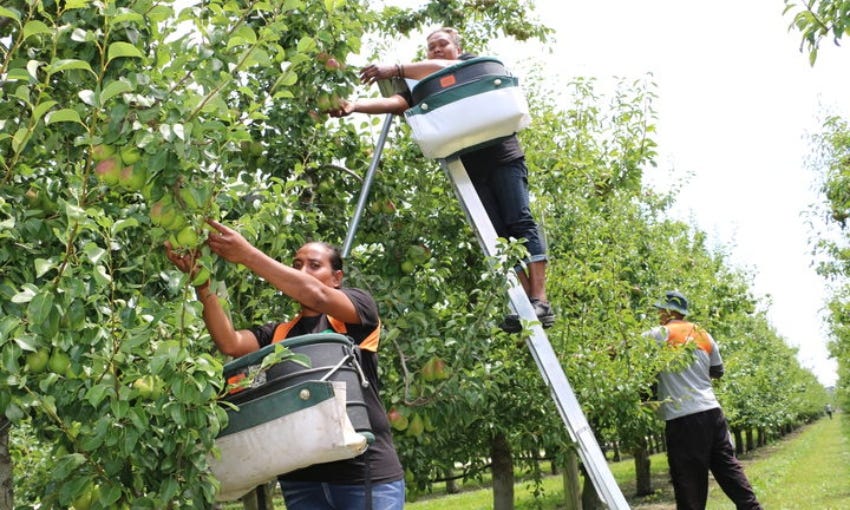Disconnect between unemployment and rural worker needs
It's not as simple as just telling unemployed people they need to move

Good morning and welcome to The Bulletin for Wednesday 6 May, by Alex Braae for The Spinoff. Presented in partnership with Z Energy.
In today’s edition: Challenges loom in matching unemployed with rural jobs, trans-Tasman travel bubble agreed in principle, and Greens push for urgent Fair Pay Agreements.

Image: Orchard workers in Hawke's Bay. (Photo: RNZ Lynda Chanwai-Earle)
It is increasingly becoming clear that one of the country's biggest economic challenges over the rest of the year will be matching people with jobs. With food exports expected to continue thriving, there is going to be heaps of work out there for people who want it. But because of the rural nature of food exports, these jobs aren't necessarily going to be in places where the people actually are, nor paying at a level that would make relocation worthwhile. And rural employers will also be competing with big infrastructure projects in cities, which will create huge demand for workers.
There have been plenty of recent examples of rural employers crying out for workers. Radio NZ reports the horticulture industry is warning that labour shortages could even lead to food shortages, if they aren't addressed. The dairy industry is also desperate right now. As Federated Farmers dairy spokesperson Chris Lewis told Mike Hosking on Tuesday, for some workers the switch has been relatively straightforward – former tourism workers in Southland are putting in applications to become sharemilkers. But he made a key point in mitigation, which was that "others are telling me they live in areas where no one lives, half an hour out of town, so they are still having the same struggles."
When conversations about redeploying the unemployed comes up, it's often framed as a case of simply telling a worker they need to go where the job is. That almost never takes into account that the worker is then taking on significant personal and financial risk, and will likely also be moving away from crucial support or family networks. Previously, this has been sidestepped by relying on migrant labour, which the primary industries do heavily. For an example of that, read this piece from the Marlborough Express about the recent harvest down there, which looked at a purpose-built facility to house about 100 people from Papua New Guinea and Vanuatu. While some migrant workers will likely stay longer in New Zealand now – and changes are being made to immigration laws to allow for easier visa extensions and alterations – the flow of new migrant workers is effectively going to stop for the foreseeable future.
Regardless of that, we are likely to see thousands – or even hundreds of thousands – of New Zealanders becoming unemployed this year. Leaked MSD documents reported on by Radio NZ show that the ministry is preparing for a wave of 300,000 benefit applications – a staggering figure, but one in line with recent Treasury scenarios about how bad unemployment could get. There are a host of negative economic and social outcomes that come with long-term unemployment. To avoid that coming to pass, much more will need to be done to not just tell people that there are jobs available, but to actually make it possible for them to do the jobs.
Just quickly, a message from our editor Toby Manhire:
"Here at The Spinoff, members’ support is more important than ever as the Covid-19 crisis lays waste to large chunks of our commercial work. It's a tight time for everyone, of course, but if you’re able to, please consider joining Spinoff Members to help us stay afloat and keep producing work by the likes of Siouxsie Wiles and Toby Morris, whose collaborations have had a real impact in New Zealand and around the world."
The trans-Tasman travel zone is going to happen – as soon as it is safe to do so, at least. The NZ Herald reports the issue came up in discussions between PM Ardern, Australian PM Scott Morrison and other Australian political leaders yesterday, with an agreement being made in general terms that it will happen. But little indication has been given about how long that might actually take – as Politik reports, one date being thrown around as a possibility is to have the bubble open by the start of the school holidays in July. There was also some interesting comment from foreign minister Winston Peters at the back end of the Herald story, who talked up the need for Australasia to start thinking of itself as "one ANZAC nation."
The Greens are pushing for Fair Pay Agreement laws to be passed urgently, as part of a package of measures to raise the pay of essential workers, reports Stuff. It comes after supermarket workers allowed the rest of the country to lock down, and prevent a widespread outbreak of Covid-19, by continuing to go into work for little more than a temporary 10% pay bump. However, the push from the Greens is likely to hit a roadblock in Labour – despite FPAs being a flagship policy for the latter, the legislation has stalled badly over the course of this parliamentary term.
An important one for the regulatory process nerds out there (I say that with admiration, btw) Cabinet has suspended the need for Regulatory Impact Analysis to accompany spending decisions, reports Stuff's Thomas Coughlan. Those are reports undertaken by Treasury, who assess the potential outcomes of changes. They use precious civil service resources, at a time when everything needs to happen quickly. But there is a lot of concern that will mean decisions get rushed without proper scrutiny taking place. The suspension will be in place until the end of August.
The volume of equity trading on the sharemarket has skyrocketed, with first time and app-based investors piling in over the lockdown. Dan Brunskill at Business Desk (paywalled) reports that it is linked to the crashing of many prices, giving those with less starting capital a chance to get in. It's seen as very useful for the market itself, and it potentially represents a shift in how people approach investing. Of course, there's still likely to be a lot of volatility in the coming months, so be warned.
Another strong warning against being hasty in thinking we fully understand Covid-19. The latest piece from Siouxsie Wiles and Toby Morris looks at the significant uncertainty that remains about how the coronavirus spread, what early studies got wrong, and how our current understanding is constantly evolving as new information comes to light. In particular, it tackles the question of asymptomatic transmission – and whether that would be better described as pre-symptomatic transmission.
And for those who are doing country-by-country comparisons (which are probably still too soon for firm conclusions) this is an essential site to bookmark. Toby Manhire has written about Covid-19 Policy Watch, a new piece of work by the people who brought you both Policy, and Policy Local. Basically Covid-19 Policy Watch will compare the key statistics and approaches of 26 roughly comparable countries, across a range of different areas including migration, business support and health policies. It's an invaluable tool, and I expect I'll be checking it a lot over the coming months.
A correction to the story about quarantine exemptions from yesterday: It was not actually true that more than a dozen exemptions had been granted, which was based on information originally given by the government. That was itself corrected – the actual number of exemptions before this one was zero – but if anyone's keeping score, they had actually made their correction before I published it wrong, so sorry about that.
Got some feedback about The Bulletin, or anything in the news?
Drop us a line at thebulletin@thespinoff.co.nz

Right now on The Spinoff: Toby Manhire reports on a survey from the PR world which shows New Zealand's government is being widely lauded for its communications. Emily Writes looks at mental health first aid, and why workplaces should take it into account more. I report on the sneaky reentry to supermarket shelves of a magazine claiming to be Woman's Day, which was formerly New Zealand's best selling women's magazine. Sam Brooks writes about Taika Waititi taking on the next Star Wars film, and how it will be a huge challenge for him to get his vision through the notoriously homogenising franchise. And author Benjamin Kingsbury writes about how New Zealand once did quarantine, looking at the treatment of leprosy sufferers 100 years ago.
For a feature today, an interview with someone doing one of the most interesting communications jobs in the country. E-Tangata has spoken to Alan Wendt – better known as one of the NZ Sign Language interpreters for parliamentary press conferences. It's a really deep and thoughtful interview, and a lot of good points are made, but for an excerpt I thought I'd share this about those pressers – the following is Wendt's own words.
I was a foreigner to these PM briefings for the media. Much less of a foreigner now, but it was like entering a new world where people had a different vocabulary. And where journaIists would be raising their hands and shouting questions. As interpreters, we’ve had to get our heads around all of that.
Another challenge for us is that we’re interpreting for a community that hasn’t had much access in their everyday lives to political discussions and to the theatre of politics. So we have a responsibility to make sure that what the PM says is accessible — and that the exchanges are, too.
Some actual news has happened in the rugby world, with Sam Cane being named the new skipper of the All Blacks, reports the NZ Herald. As the story covers, he's seen as having strong leadership qualities by new coach Ian Foster, and is good at getting results out of teammates. Of course, when he actually gets to take the field as captain is somewhat up in the air, but at the moment Cane seems likely to have a decent long-term tenure in the job.
That's it for The Bulletin. If you want to support the work we do at The Spinoff, please check out our membership programme




